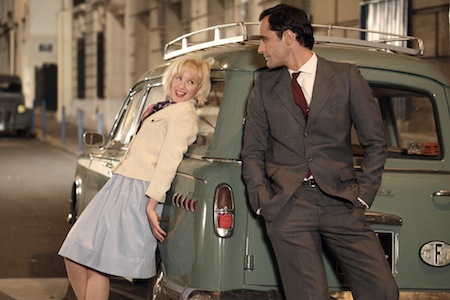With his latest musical, Beloved, Christophe Honoré has created something never really seen before in the genre—a salute to psychological depression brought on by AIDS. I want to be very careful about what Honoré has and hasn’t done. For while the musical is traditionally associated with sweetness and light, grimness isn’t exactly absent. West Side Story and Porgy and Bess are most striking in this regard. But as John Cutts reminds us in his “Dark Side of the Light Fantastic” entry to Motion’s Companion to Sadism and Violence in the Cinema (February 1963) there’s “a very nasty episode in which Fred Astaire falls from a high piece of stage scenery while drunk” in Blue Skies, “Lana Turner is beaten up by Dan Dailey (in Ziegfeld Girl) and Robert Siodmak and Herman J. Mankiewicz’s ineffable rendition of Somerset Maugham’s Christmas Holiday—“songs by Deanna Durbin, killings by a homicidal Gene Kelly.” Jacques Demy’s bittersweet The Umbrellas of Cherbourg struggles toward a relatively happy ending, while his otherwise cheery The Young Girls of Rochefort climaxes with the revelation that one of its seemingly sweet-spirited characters is an axe murderer. And 13 years before Honoré’s AIDS musical, there was Olivier Ducasterl and Jacques Martineau’s Jeanne and the Perfect Guy. That salute to Jacques Demy (who himself died of the disease) starred his son Mathieu as a youth who becomes inflicted due to drug addict needle-sharing. He sung his heart out to his beloved, Virginie Ledoyen, in songs the filmmakers had written with composer Philippe Miller, much in the style of Demy and his musical collaborator Michel Legrand. The outcome was scarcely Mickey and Judy but a note of hope remains—much on the order of the hopefulness of Honoré’s previous musical Love Songs (2007) in which Louis Garrel, despondent after the sudden death of Ludivine Sagnier finds new and decidedly unexpected love in the eager arms of Gregoire LePrince-Ringuet, leading to my favorite last line in the history of the cinema: “Love me less, but love me for a long time.’
For while the musical is traditionally associated with sweetness and light, grimness isn’t exactly absent. ‘West Side Story’ and ‘Porgy and Bess’ are most striking in this regard.
With Beloved Honoré goes himself one better/worse. For while death figures here to, this time composer Alex Beaupain has nothing cheerful for the actors to warble. It’s all downbeat ballads. And while the performers and images are as lovely as anything confected by Metro it all comes to grief in a way that some viewers will appreciate while others will find quite off-putting.
So much the worse for them.
It all begins on the sprightliest of notes (you can stretch the metaphor any distance you like) with Ludivine Sagnier’s Madeleine trotting off to work at a chic shoe shop to the tune of a French cover of “These Boots Are Made For Walking”—a big hit in the early ’60s where the story begins. Casually leaning up against a wall near the shop one afternoon she’s mistaken for a prostitute, a notion that pleases her in that turning the odd trick will supplement her income handily. But no sooner has she does so than she meets Jaromil (Radivoje Bukvic), a handsome Czech. In no time at all they’re married, she’s pregnant, they’re back in Czechoslovakia—and the Russian army has invaded. Our heroine returns France, where she reaches adulthood as Catherine Deneuve and their daughter likewise as Chiara Mastroianni.

“It’s not an effort to write big story through individual destinies,” Honoré told me recently of this decidedly ambitious project. “What interested me was the passage of time. An image in which certain things change and others remain behind.” This comes though quite automatically via the fact that Deneuve and Mastroianni (the latter Honoré’s virtual muse, prominently present in nearly all his films) are actual mother and daughter. But it works in other ways as well in that the adult Jaromil plays played by internationally famed director Milos Forman (Amadeus, One Flew Over the Cuckoo’s Nest) who himself emerged from the period of Czech history the film depicts.
But it’s the modern history of the AIDS pandemic that hit closest to home for Honoré who, having been born in 1970, came of age when this disaster struck. “For me and my friends, love always had the shadow of death nearby.” This is made startlingly clear when Chiara Mastroianni’s Vera (doubtless after Chytilova as Jaromil evokes Jires, another Czech New Wave touchstone) falls in love with Henderson (Paul Schneider), a gay American rock drummer she meets at a club. Her intentions are clear as the scene features a dance solo for Mastroianni, as intense as Monica Bellucci’s in Philippe Garrel’s A Burning Hot Summer. He’s quite honest with her. He discloses his sexual orientation, “promising nothing,” though he’s somewhat attracted to her. She, by contrast becomes obsessed with him, an obsession that not only fails to pale but is stoked to the max when he seroconverts. Is Honoré saying that the truest love is that of Death? It’s not an unreasonable conclusion— making Beloved an unreasonable film by commercial standards. It didn’t repeat the success of Love Songs in France, and is destined for the (un)happy few stateside. But it cannot be dismissed and it will not be forgotten.
It should be pointed out that the original French title of Honoré’s film is Les Bien-Aimes— The Loved Ones. Perhaps the U.S. distributors thought that title would be confused with Tony Richardson, Terry Southern and Christopher Isherwood’s adaptation of Evelyn Waugh’s The Loved One. But Beloved is also the title of Jonathan Demme and Oprah Winfrey’s film of Toni Morrison’s novel of the same name, which was a major flop. No guts no glory. And Christophe Honoré has plenty of both.
Beloved is dedicated to the memory of Marie-France Pisier, a Truffaut discovery whose most famouss films are André Téchiné‘s Souveniers d’en France, Jacques Rivette‘s Celine and Julie Go Boating and Charles Jarrot’s Sidney Sheldon’s The Other Side of Midnight. She drowned in her swimming pool last year.




